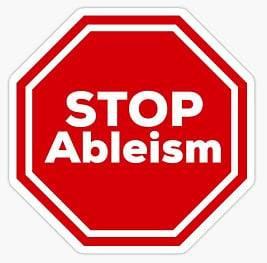Responding to Discrimination Against Individuals with Disabilities and Medical Conditions During the COVID-19 Outbreak
Responding to Discrimination Against Individuals with Disabilities and Medical Conditions During the COVID-19 Outbreak

Major crises raise people’s concern for personal safety and heighten anxiety. One effect of this heightened anxiety is that it can intensify bias and discrimination as we start focusing our attention on our own well-being. Throughout the COVID-19 crisis many individuals with disabilities and those managing medical conditions who face additional hurdles due to the alterations and disruptions to their lives have been reporting a lack of sensitivity towards their needs. These issues are not new but have been exacerbated and made more visible to the general public by the COVID-19 pandemic. We write to highlight ways to respond if you are experiencing this insensitivity and discrimination or if you are an ally who wants to support people being marginalized this way.
This insensitivity, bias, and discrimination is known as ableism - a form of prejudice and discrimination, both intentional and unintentional, by which individuals with disabilities are devalued and discriminated against. In addition, having a disability and/or managing medical conditions can be both a visible and invisible identity. That is, sometimes you can see that someone is experiencing a medical condition or disability, and other times there is no visual indication. For example, individuals who are immunocompromised may visibly appear to be free from health concerns but be critically vulnerable to serious injury and/or death from COVID-19. For others, such as individuals with mental health conditions, the stress and anxiety or impact of social isolation related to COVID-19 can look like an exacerbation of already existent symptoms.
During the current crisis, ableism has taken the form of undermining the seriousness of the disease with minimizing statements, like “people are making a big deal out of nothing,” and “people are just looking for excuses to stop working/going to school.” These statements disregard the legitimate worry and safety concerns individuals have with regard to their wellbeing and can lead to feelings of shame for taking care of oneself, to reductions in seeking support, and to taking fewer precautions for one’s own safety to try to further hide one’s health concerns. Related ableist behaviors also include disregarding recommended practices for hygiene and safety. COVID-19 can spread even if someone is not suffering from symptoms, which poses significant risk of transmission to individuals - and their caretakers - vulnerable to the disease.
Moreover, accommodations that are being made in response to the pandemic demonstrate how society has largely disregarded accessibility concerns until they impact able-bodied individuals. Many people with disabilities have been asking for accommodations that involve remote work and online education and have been denied for ages. Making these adjustments now for able-bodied people highlights the previous erasure of the needs of individuals with disabilities.
If you have experienced discrimination and prejudice towards your disability or medical condition:
-Recognize that your concerns are real. You have a need and right to practice the necessary safeguards you need to keep yourself safe despite what an offender may state. If you are experiencing obstacles to receiving accommodations for working or learning, consider reporting this to the office responsible for disability-related support or the government through the Americans with Disabilities Act.
-Practice self-care, build community, and support one another. Being attacked, not being seen, and having to take extra steps to access necessities in life can be draining. Take time to rest and recharge physically and mentally. It may feel as though you are the only one in your area requiring assistance or accommodations. Reaching out to individuals and organizations that you identify as supportive and understanding can help you feel less alone.
-Recognize the strengths you hold in managing a disability and medical condition. Your practices and considerations have helped identify ways to manage these crises, and promote accessibility for all. For example, your considerations of how individuals access public spaces (e.g., live events, meeting spaces) help increase access for all (e.g., through remote work, livestreaming events).
Ableism is an issue we must all address, not just individuals engaging in or affected by ableism. You can support those facing discrimination by:
-Address minimizing and insensitive statements made by others. Though this may be uncomfortable to do if you are not used to it, making statements like “What you are saying is dangerous for people who are especially vulnerable to the disease,” and “You may not be able to visually identify people with disabilities and medical conditions who are at risk.” Moreover, given that having a disability or managing a medical condition can be an invisible identity, address statements others make about individuals who may not look like they have a disability or medical condition, as individuals shopping at accommodated grocery hours have been facing backlash for “not looking sick.” Online, you can share graphs and visual simulations about how necessary all the precautions advised are to helping our healthcare system and society manage the situation.
-Offer support to individuals facing discrimination and ask permission to act on their behalf. This can include offering to speak to others about the discrimination or to write letters or report the discrimination. It can also involve listening to people expressing their pain and hurt and making sure to validate that pain and the reality and injustice of their ableist experiences.
-Offer to drop off groceries or other supplies can also help people reduce their risk and minimize ableist experiences from delivery services.
-Be mindful of “panic buying.” Take inventory of what you need, and consider purchasing products over time, so items can be available for those with urgent need.
-Continue to take individual precautions to contain the outbreak and protect others at risk. While one’s own personal safety but not be in jeopardy, maintaining social distancing, washing one’s hands when handling items, and other CDC and WHO recommended practices can help prevent the spread of the disease to those who are vulnerable.
-Encourage policies and practices that do not assume all are able-bodied. For example, if remote work or learning was offered by your organization, consider ways in which such practices can be continuously promoted even when the crisis alleviates. This also means not questioning when others request accommodations.
-Remember these perspectives when this immediate crisis is over, because these issues will continue to impact individuals with disability in future crisis situations and in daily life. Advocate for continued protections and accommodations for individuals with disabilities and medical conditions, including centering their needs as a priority on an ongoing basis in your workplace, place of learning, and daily life.
-Find ways to connect to the sense of caring and concern for others you feel now and create reminders for continuing to help later. This may include: practicing empathy for all, educating those in your social circles, posting relevant articles on social media, offering economic and social support, and remembering that it is especially important to also be caring for yourself physically and mentally.














